Thanks for your support! If you make a purchase using our links in this article, we may make a commission. And, as an Amazon Associate, I earn from qualifying purchases. See the full disclosure here.
Updated February 18, 2024
It’s finally time to bust your RV out of storage, but de-winterization can be tricky, so don’t let foul RV antifreeze taste or smell derail your excitement.
Full-time RVers won’t need to worry about antifreeze taste or smell because they won’t need to use it. Constantly using the water pipes in your RV will keep the water flowing even in the coolest temperatures. But for those of us who use our RVs seasonally, winterizing is a necessary evil.
Join us as we delve into the best type of RV antifreeze to use, so you’ll know any lingering RV antifreeze taste and smell isn’t dangerous. We’ll also cover how to flush your water system to make that RV antifreeze taste and smell better. Finally, you’ll learn tricks to help you flush your water system mid-camping trip.
After this, if the RV antifreeze taste and smell still won’t go away, there may be other causes of foul-smelling or bad-tasting water. For this, we’ll show you how to sanitize your freshwater tank.
This will help you remove that funny RV antifreeze taste and smell. Sanitizing has the added benefit of cleaning and disinfecting your freshwater tank.
The dreaded RV antifreeze taste and smell will disappear if you follow our simple tips and tricks!
Why Does My Camper Water Smell Like Antifreeze?

If your RV water smells like antifreeze, there’s residual antifreeze left in the system. When you winterize an RV, you add antifreeze to the water system. To de-winterize, it should be no surprise that you need to flush your water system to remove that RV antifreeze taste and smell.
Does RV Antifreeze Leave a Taste?
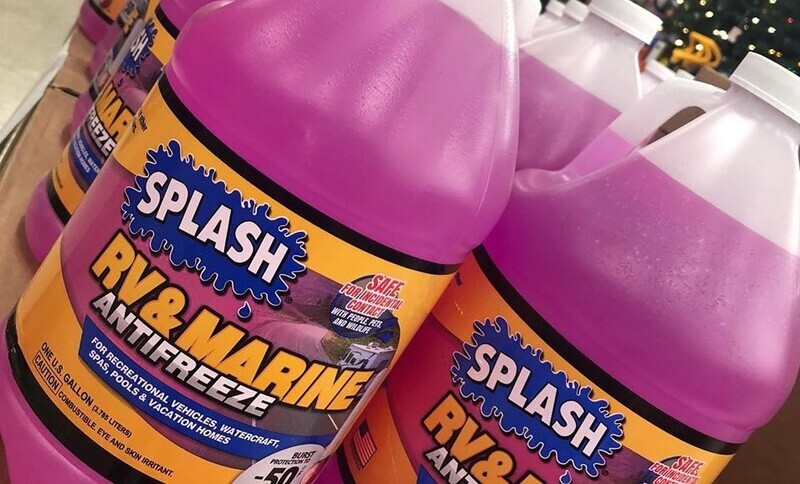
Residual RV antifreeze can both taste and smell funny. You may freak out when you realize your little one has just brushed their teeth with antifreeze-tainted water from your RV sink if you’re like me.
Fortunately, if you used the right type of RV antifreeze when you winterized your camper, it’s non-toxic and safe for both people and pets.
Always purchase antifreeze intended for use in RVs. Regular antifreeze contains ethylene glycol, which has a sweet taste but is highly toxic if accidentally ingested.
As of December 13, 2012, the Humane Society Legislative Fund with Consumer Specialty Products Association announced that ethylene glycol-based antifreeze industry manufacturers would start adding a bittering agent to their products to help prevent accidental ingestion by pets and children.
The best RV antifreeze will have propylene glycol as the active ingredient. The FDA and CDC have recognized propylene glycol as a safe product. It’s even used as a food preservative.
If some propylene glycol RV antifreeze is left behind in your water system, your water may taste slightly sweet. RV antifreeze taste and smell may not be desirable, but accidental ingestion of propylene glycol-based RV antifreeze shouldn’t hurt you.
Propylene glycol-based RV antifreeze is also best for your RV as it acts as a lubricant. It’ll help prevent the PEX plumbing, seals, and other components in your RV plumbing from drying out.
RV antifreeze can be hard to find outside of a specialty RV store. Fortunately, great options like Splash RV/Marine Antifreeze can be found at Walmarts, auto parts stores, and it can be ordered online.
Don’t drive to your local gas station and grab just any antifreeze off the shelf. Lingering RV antifreeze taste or smell is a whole let less concerning when you know the antifreeze you used is non-toxic.
What Is RV Antifreeze?
The purpose of RV Antifreeze is to protect your RV’s plumbing system. In cold weather, any residual water left in your RV is at risk of freezing, expanding, and damaging your RV.
RV Antifreeze prevents this freezing and expansion and is an important component of proper winterization.
Just as it can be challenging to remove all water from your RV, removing all antifreeze can also be tricky. RV antifreeze is non-toxic because often residual amounts will be left behind in freshwater holding tanks and faucets.
Even if you don’t live in a colder climate, it’s a good idea to add RV antifreeze to your lines anytime you’ll be storing your rig for an extended amount of time. Doing so will help to keep your plumbing in good working order.
RV antifreeze is one of the most essential components of proper RV maintenance.
What’s The Difference Between RV Antifreeze And Automotive Antifreeze?
RV Antifreeze isn’t toxic, while automotive antifreeze is highly toxic. Fortunately, it is easy to tell the difference.
RV antifreeze is typically pink and commonly referred to as “the pink stuff.” On the flip side, automotive antifreeze is usually green and alternately known as engine coolant.
The active ingredient in RV Antifreeze, propylene glycol, has been acknowledged by the FDA and CDC as safe. In fact, it’s even a common component in food preservatives.
Propylene glycol has the added benefit of acting as a lubricant for your RV’s plumbing. It prevents PEX plumbing, seals, and other aspects of your RV plumbing system from drying out.
On the other hand, automotive antifreeze is highly toxic if ingested. What’s worse, the active ingredient, ethylene glycol, has a naturally sweet taste. This sweetness makes traditional antifreeze especially dangerous for children and pets who may be drawn to it.
Fortunately, industry regulations now require manufacturers to add a bittering agent to ethylene glycol-based products to help prevent accidental ingestion.
RV antifreeze may not be toxic and is the appropriate choice for your RV’s plumbing. But automotive antifreeze has its application. Never use RV antifreeze in the engine of your motorhome.
It can’t withstand the heat and will burn up. Motorhome owners should keep extra of both the pink and the green stuff on hand as they are not interchangeable.
Accidental poisoning is possible if traditional antifreeze is used in your plumbing. Damage to your motor is likely if RV antifreeze is used in your engine. That’s why it’s crucial to differentiate between RV antifreeze and automotive antifreeze.
Is RV Antifreeze Toxic?
No, RV Antifreeze isn’t toxic. It’s designed specifically for RV plumbing with the understanding that residual amounts may be left behind even after a camper is de-winterized.
You may still want to remove undesirable RV antifreeze taste or smell from your camper. But don’t panic if you feel some of the pink stuff has been left behind in your plumbing. Propylene glycol-based RV antifreeze is not toxic, and accidental ingestion shouldn’t hurt you.
Is RV Antifreeze Toxic to Animals and Pets?
Although significantly less dangerous than ingesting traditional antifreeze, RV antifreeze can be toxic to animals and pets.
Cats are especially prone to kidney and nervous system problems if they ingest even a small quantity of RV antifreeze. Dogs can also be harmed by ingesting larger quantities of RV antifreeze.
This is especially concerning when we consider how a pet might come in contact with RV antifreeze. Humans may encounter small residual quantities of RV antifreeze from tap water within their rig. Animals, on the other hand, are far more likely to come across RV antifreeze that has been spilled or improperly dumped.
This means that if your furry friend has come across RV antifreeze, it’s likely that they’ve consumed a larger quantity than could ever be left as a residual in your RV’s plumbing.
Large amounts of any chemical ingestion can be very dangerous. If you suspect your pet has taken a drink of antifreeze, even if it’s the less toxic RV antifreeze, it’s best to call your veterinarian immediately.
How Do You Flush RV Antifreeze?
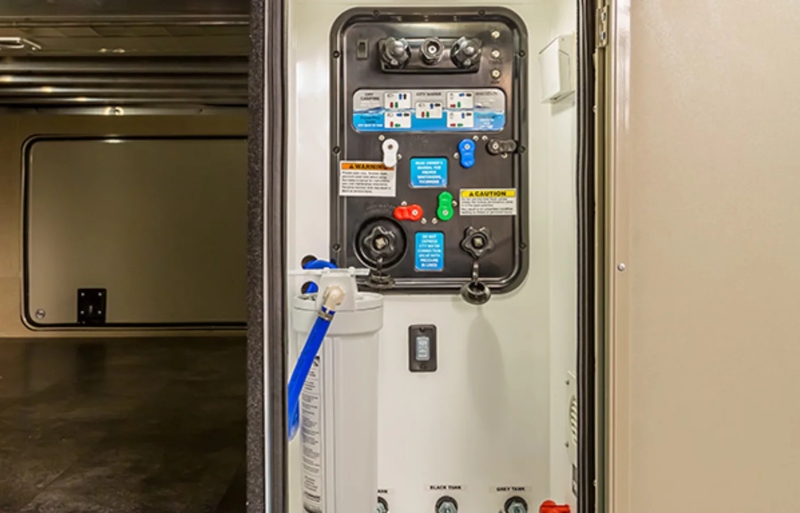
When you have residual RV antifreeze taste and smell coming from your water pipes, your first course of action should be to flush the water system. There are eight steps to flush antifreeze from your camper water system.
- Turn on your water pump.
- Turn on all the faucets, including indoor and outdoor sinks and showers.
- Run the water until you see clear water.
- Flush the toilet a few times to clear out the pink or green antifreeze.
- When you stop seeing the antifreeze color in your water, turn off the faucets and the pump.
- Reconfigure the water heater, so it’s no longer bypassed.
- Replace any water filter cartridges that you removed before winterizing.
- Dump your gray and black water at a nearby dump station.
Removing the RV Antifreeze Taste and Smell from the City Water Connection
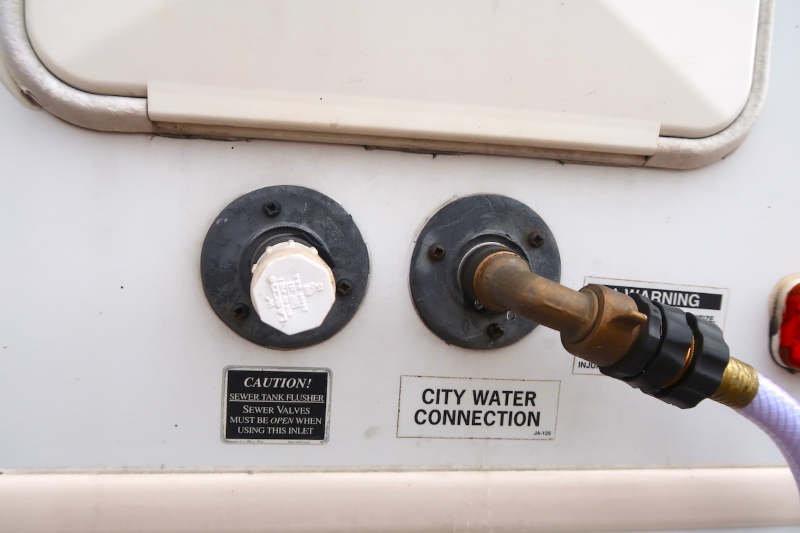
Another method is to avoid using your RV water pump and instead flush antifreeze from your camper’s water system using a garden hose or city water supply. Simply attach the hose to your RV’s city water connection instead of turning on the water pump, then follow the steps listed above.
Removing the RV Antifreeze Taste and Smell Using a Submersible Water Pump
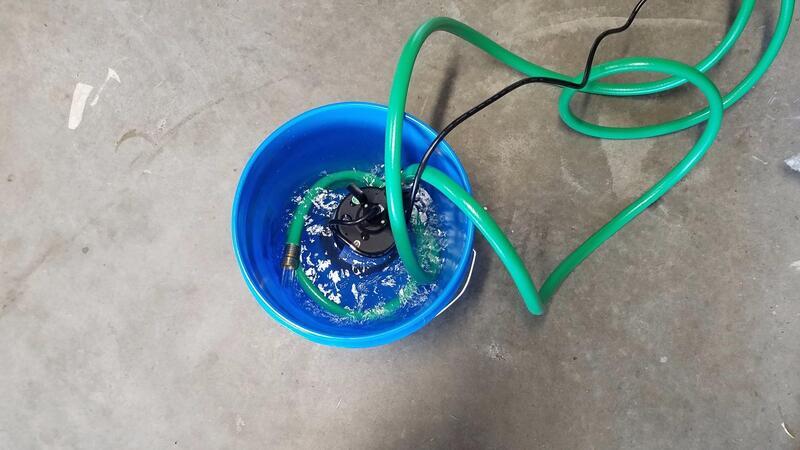
We prefer to book our first camping trip of the season at a full hookup campsite to make it easier to flush our RV water system. But if you ever find yourself camping without full hookups and discover a lingering RV antifreeze taste or smell, don’t worry. You won’t need to break down camp to fix the problem. You can bring clean water to your campsite in buckets, then use a submersible water pump and hose to pump the water into your camper. The antifreeze taste and smell can then be flushed from your system as you normally would.
How Can I Make My RV Water Taste Better?
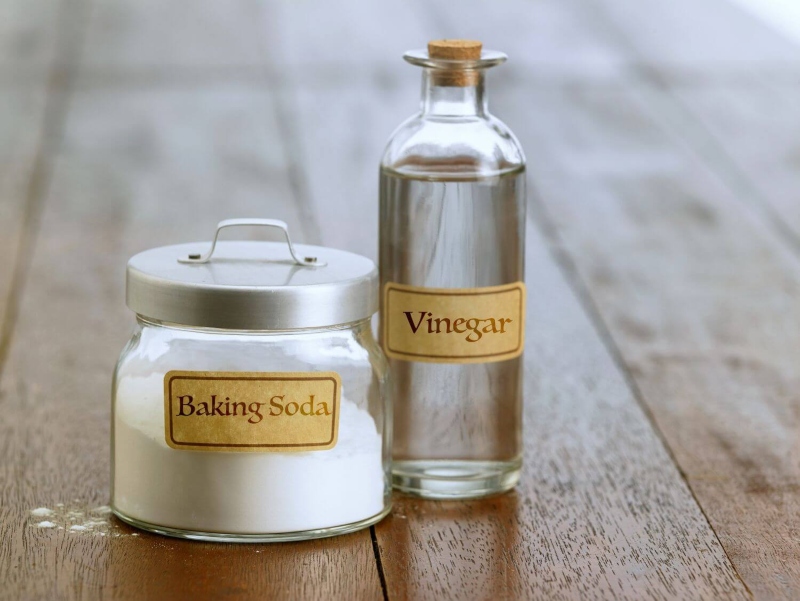
Many times, flushing your water system for several minutes will be enough to get the RV antifreeze taste and smell to go away. If that residual RV antifreeze taste and smell aren’t gone after simply flushing the system, you can use baking soda to remove the bad taste.
You’ll want to sprinkle the baking soda directly in each drain or mix it with water and pour it down the drains. Once you’ve added the baking soda, you will need to perform a water system flush again. The same mixture can be used to rinse out your RV plumbing.
How Do I Get the Smell Out of My Camper Water Pipes?
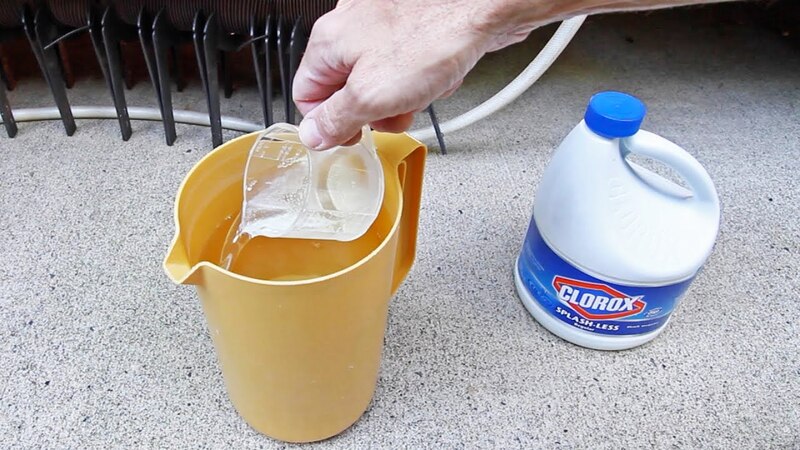
Even if you flush the water system in your camper several times, you may still notice a bad RV antifreeze taste and smell. There may still be residual antifreeze, but it’s also possible that bacteria and mold have grown in your RV water tank after months in storage. To clean your water system thoroughly, you will want to sanitize the RV water lines.
This is easy to do with premixed freshwater tank sanitizing products. You can also make your own sanitizing solutions by using ¼ cup bleach per gallon of water or 2 quarts of white vinegar per gallon of water. (Just be sure not to mix the bleach and vinegar mixture!)
No matter which sanitizer you choose, the sanitization process is pretty easy:
- First, turn off the water pump and water heater. Then drain the freshwater tank.
- Add the sanitizer to the freshwater tank.
- Fill the remainder of your RV water tank with clean water.
- Open all your faucets and let them run until you smell the cleaner. Then shut the faucets off.
- Rock your RV or take it for a short 10-minute drive to ensure the sanitizer mixes around the tank.
- Wait the appropriate amount of time, based on your preferred sanitizer. Usually 8-12 hours.
- Drain your freshwater tank.
- Turn on all of the faucets once more. This time let them run until you no longer smell sanitizer. Then drain your freshwater tank again and refill.
There are other types of freshwater tank sanitizing methods you can use. Some RV accessory companies make premixed solutions that come already pre-diluted or are easy to mix with water. Our discussion on how to sanitize your RV freshwater tank explores all of the methods and the steps in further detail.
Eliminating RV Antifreeze Taste and Smell for Good
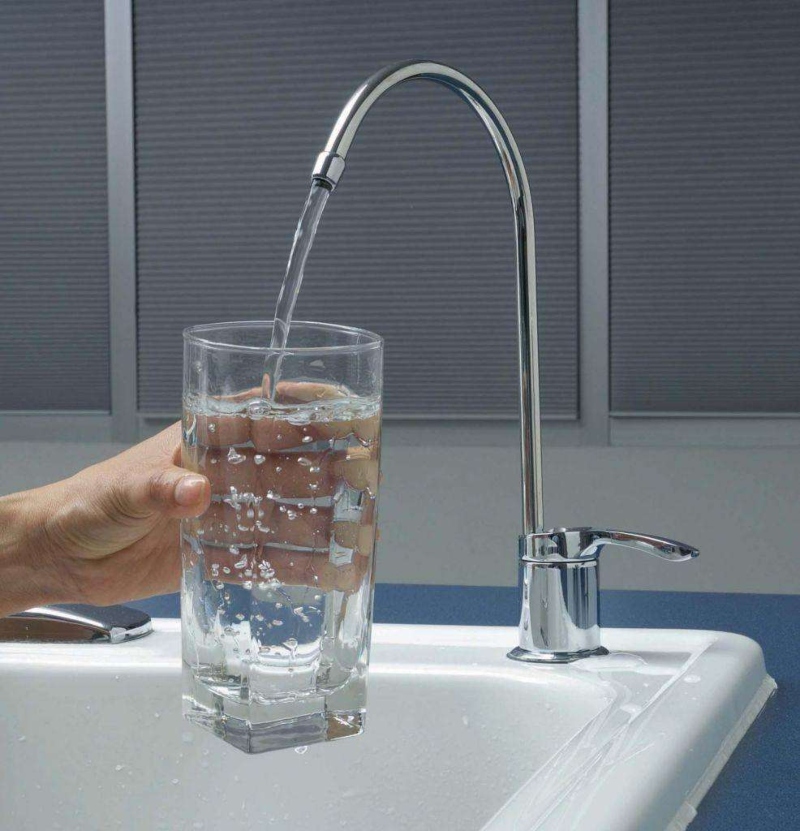
Eliminating RV antifreeze taste and smell can be a daunting task, especially if you’ve never dealt with it before.
We somehow made it into August one summer, only having camped on full-hookup sites. We didn’t realize we’d forgotten to drain and flush the antifreeze from our freshwater tank until we were filled up with water and set up on an electric-only site. Being the newer parent I was, I panicked when I realized our freshwater was mixed with leftover RV antifreeze.
I hope you can learn from my mistakes and avoid the panic and the inconvenience of RV antifreeze taste and smell in your water. Using a safe RV antifreeze will mean even accidental ingestion won’t be a cause for panic.
The best tip is to prevent RV antifreeze taste and smell by performing a flush of your water system immediately after bringing your camper out of storage. If you still smell or taste RV antifreeze, you can use the baking soda method. If the smell or taste lingers, you can get rid of it by fully sanitizing your freshwater tank.
5 FAQs About RV Antifreeze
1. Can I Use RV Antifreeze In My Motorhome Engine?
Don’t ever use RV antifreeze in your motorhome’s engine. Non-toxic RV antifreeze and automotive antifreeze both have their applications.
Automotive antifreeze, also known as engine coolant, is the only product you should be using in your motorhome’s engine.
Pink RV Antifreeze simply can’t withstand the temperatures an engine puts out and will cause damage to your engine as a result. So while the typically green ethylene glycol-based antifreeze is the toxic version, it’s the only kind of antifreeze that will adequately protect your engine.
2. What Should I Do If I Ingest RV Antifreeze?
If you accidentally ingest RV antifreeze, there is no need to panic. Propylene glycol, the active ingredient in RV antifreeze, is used in food preservatives and other products we use all the time.
Remember, because of its application, RV antifreeze is specifically formulated to be non-toxic.
While you still probably don’t want to go drinking a bottle of the pink stuff, any residual RV antifreeze drops left behind in your plumbing lines shouldn’t cause harm to anyone in your family.
3. Is It Okay To Put RV Antifreeze In My Freshwater Tank?
Yes, it’s a good idea to put RV Antifreeze in your freshwater tank. As in your gray and black tanks, cold weather can cause any remaining water left to freeze and crack your freshwater tank.
Even though this RV antifreeze is not toxic, remember to properly flush it from your freshwater tank to avoid unwanted tastes and smells.
4. Is It Safe To Dump On The Ground?
It’s never a good idea to empty any of your RV tanks directly on the ground. Not only will your fellow campers look at your cross-eyed, but you’re likely to incur a hefty fine. Dumping RV antifreeze is no different.
It can kill vegetation, and in large quantities, it can still be harmful to animals. While spilling a few accidental drops won’t cause any harm, always make an effort to dispose of RV antifreeze properly.
5. Where Can I Buy RV Antifreeze?
RV antifreeze can be a little trickier to find than automotive antifreeze. RV specialty stores will undoubtedly have it, as will gas stations and service centers located near popular camping destinations.
If you can’t find RV antifreeze for purchase locally, it can always be ordered online.
1. How to Remove the Plastic Taste from Your RV Water
2. How to Sanitize Your RV Fresh Water Tank
3. How to Winterize a Tankless RV Water Heater
4. Why UV Water Purification Systems for RVs are Vital
5. 15 Best Drinking Water Hoses for Your RV or Camper
About the Author
Laura Tyrell – Author and Part Time RVer
Laura is a part-time RVer and a full-time mom of three. Long-time campers and RVers before children, Laura, and her husband have fallen even more in love with the RV lifestyle since becoming parents to a child with food allergies.
Having her own kitchen on wheels makes her RV trips amazing. Laura is passionate about finding ways to make traveling with young children fun, easy, and attainable.
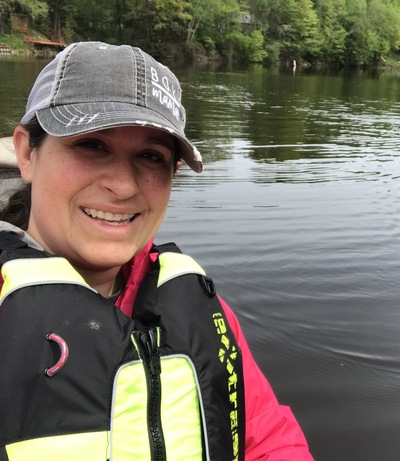

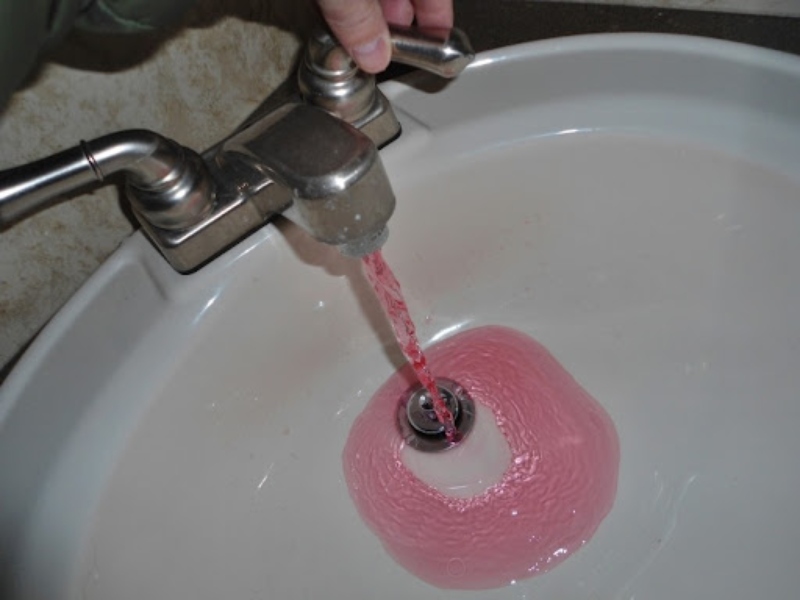
Lots of helpful advice for new RVers like me, but one thing I don’t get. How does”the baking soda method” remove the smell and taste from RV pipes if you only put it into the drains? I can see that helping with the smell, but not the taste.